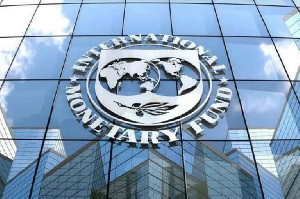 The International Monetary Fund
The International Monetary Fund
The International Monetary Fund (IMF) says government’s plan of relying on tax compliance to generate more revenue, especially from the newly introduced taxes, may not yield the expected results – given the experience of past compliance challenges and complexities, thereby widening the budget deficit.
The Fund, in its staff report for the 2021 Article IV Consultation, says the introduction of new taxes – which government projects will add revenue equivalent to 1.4 percent of GDP, will not be met but fall short by 0.5 percentage points.
What this means is that government will realise about GH¢4billion, compared to the over-GH¢6billion it has projected to get from the taxes, as the Fund is doubtful the current tax administration system, which is banking its hopes on enhanced compliance to achieve the target, can really do that; a situation that will widen the budget deficit to 13.9 percent of GDP at the end of the year against government’s target of 10.9 percent.
“The budget law introduces new revenue measures yielding 1.4 percent of GDP, including VAT and NHIS rate hikes, higher fuel excises, a new bank profit levy, and more effective tax administration thanks to large taxpayer audits, especially in mining sector; and the establishment of special courts to speed-up case settlements and payment collections.
“Compared to the budget law, staff project a 0.5 percentage point of GDP lower yield from tax administration measures, in light of the experience of past compliance efforts and the complexity and delays inherent to large taxpayer audits. As a result, staff project a budget deficit of 13.9 percent of GDP in 2021, including energy and financial sector costs,” the IMF report stated.
Government introduced a number of taxes in the 2021 budget with the hope of raising some GH¢72.4billion in revenue after achieving the revised target for last year – despite reduced economic activity stemming from impacts of the coronavirus pandemic on the economy.
Out of the 2021 target amount, about GH¢70.9billion is expected to be raised from domestic sources. Of this, non-oil tax revenue will constitute about 74 percent, which will amount to GH¢53.6billion – equivalent to 12.4 percent of GDP.
This essentially means government aims to heavily rely on taxes as the main revenue generation strategy to address persistent shortfalls it has faced in the last four years. Hence, the budget statement has introduced new taxes and made an upward revision of some existing ones.
Among the taxes government has introduced to achieve this target is a new tax dubbed the COVID-19 Health Levy, which will see a one percentage point increase in the National Health Insurance Levy and a one percentage point increase in the VAT Flat Rate to support expenditures related to COVID-19.
In addition to this, government said it is proposing a Sanitation and Pollution Levy (SPL) of 10 pesewas on the price per litre of petrol/diesel under the Energy Sector Levies Act (ESLA); and a further Energy Sector Recovery Levy of 20 pesewas per litre on petrol/diesel under the ESLA as a means of finding additional resources to cover the excess capacity charges which have resulted from the Power Purchase Agreements (PPAs).
Tax administration
A survey conducted by the Institute for Fiscal Studies’ (IFS) Centre for Tax Analysis in Developing Countries (TaxDev) and the Tax Policy Unit at the Ministry of Finance revealed that while corporate tax revenues have grown noticeably in recent years, personal income tax and VAT revenues have stalled relative to GDP. International comparisons are suggestive that collections for these two taxes in Ghana are relatively low, given the tax rates in place.
The decline in revenue collections, the report says, is partly due to changing the GETFund Levy (GETFL) and National Health Insurance Levy (NHIL) into ‘straight levies’ which cannot be reclaimed; and the introduction of VAT withholding.
VAT revenues relative to GDP have barely increased over the period, once combined with NHIL and GETFL revenues – which have effectively functioned as an additional VAT for much of the period – the overall growth is from 2.3 percent to 3.6 percent of GDP.
In terms of personal income tax (PIT), tax revenue in Ghana is lower than many comparative countries in sub-Saharan Africa (SSA).